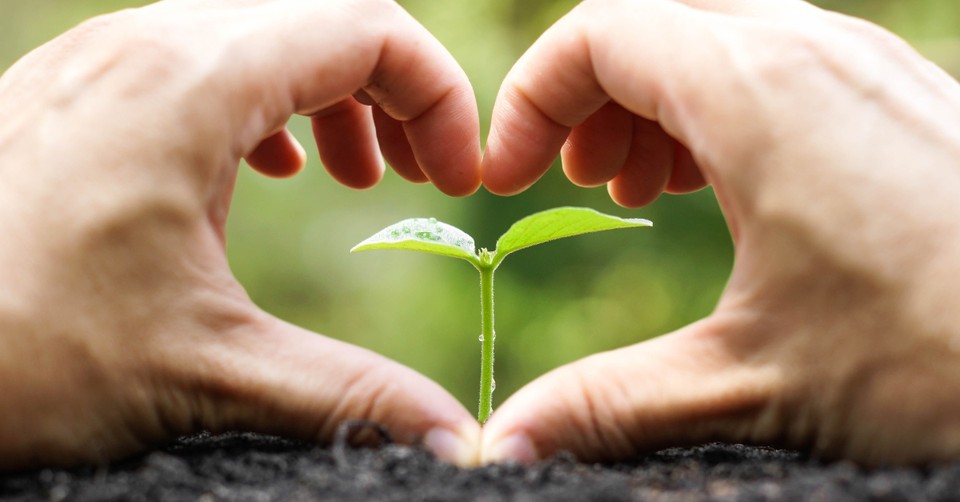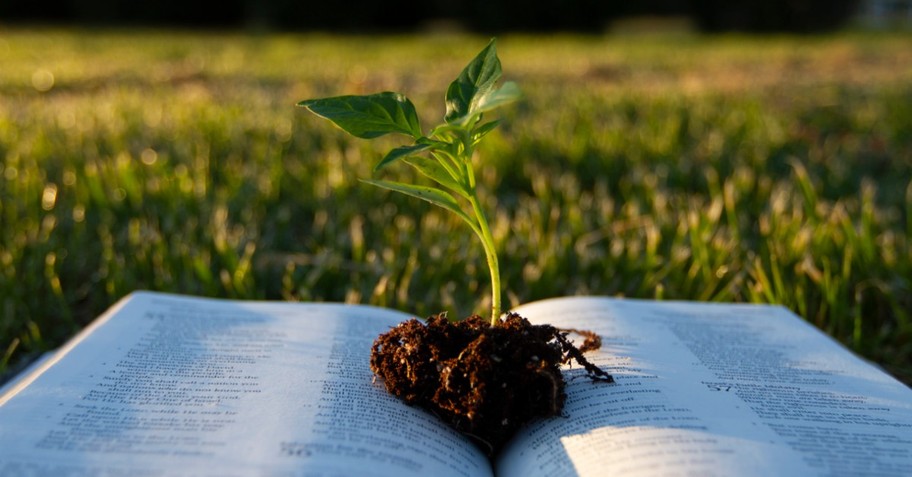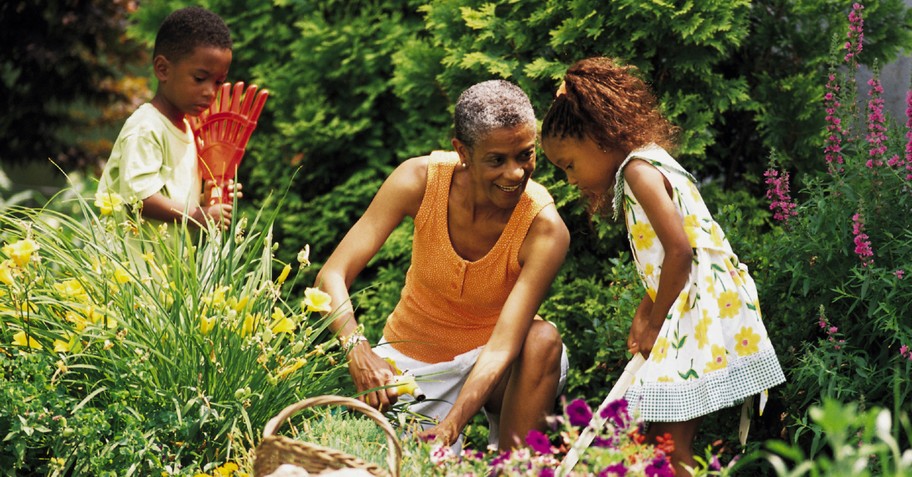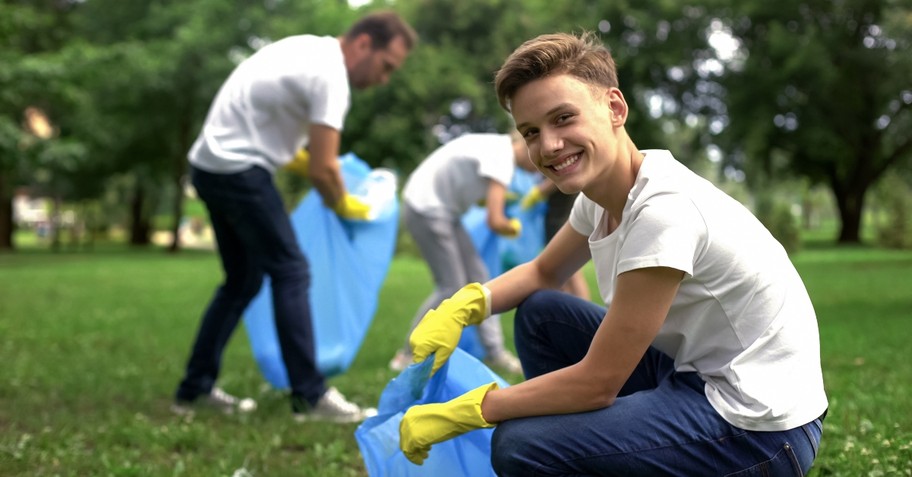Should Christians Care about Protecting the Environment?

I love being outside. The fresh air and blue sky provide a welcome break from the screens that seem to dominate our lives nowadays, and just being outside to watch and listen is such a joy for my soul.
It’s easy to see signs of God’s handiwork when you look at nature. Gazing out at the ocean and contemplating its enormity reminds us that God holds the oceans in the palm of his hand, and has cast our sins as far as the east is from the west (Psalm 103:12). Hiking in the mountains reminds us of his majesty, and puts our carefully crafted bodies to work. Even sitting on my porch watching the birds and squirrels reminds me that our God cares about the smallest creatures in creation.
He is a God of physics, crafting gravity and the basics of engineering to keep my second-story balcony upright. He is a God of biology, who orchestrated every leaf and root of my tomato plant to produce fruit. He is a God of genetics, who gifted man with the ability to cross-pollinate plants to create beautifully colored flowers. God’s fingerprints are seen all across creation.
But the effects of sin are also clearly seen in our world – especially in nature. Unnatural heat withers the flowers and grass, turning it brown and dead. Our selfishness and carelessness fills the oceans with garbage, suffocating the animals there. Storms and wildfires tear through towns and landscapes, leaving a path of destruction.
These effects of sin on our world are not something we can fight. When man battles nature, nature will always win. But God did give us a duty when he put mankind on this earth – to rule over the land and care for it.
Photo credit: ©Getty Images/weerapatkiatdumrong

Does the Bible Talk about Environmentalism?
When we bring up the term “environmentalism” in regards to Christianity, some folks get upset. Personally, I see no need for this, and fear that we are getting too caught up in an “us-versus-them” mentality. Christians certainly should care about the environment; it should not be a political issue. To help us understand why, first let’s define the term environmentalism:
“Advocacy of the preservation, restoration, or improvement of the natural environment, especially: the movement to control pollution.”
We know that one day God will ultimately restore all things, in the New Heaven and the New Earth (Revelation 12). But that doesn’t mean we should sit idly by and let things deteriorate around us. The Bible calls us to preserve and protect the natural world that God has placed us in.
The first, and most well-known, verse about this is Genesis 1:26. “Then God said, ‘Let us make mankind in our image, in our likeness, so that they may rule over the fish in the sea and the birds in the sky, over the livestock and all the wild animals, and over all the creatures that move along the ground.’”
We see in this verse that God made us in His image; the fish of the sea and the birds in the air and the livestock do not have the same capacity for compassion and creation that we do. That gives us a responsibility, evidenced by the word “so.” Because we are made in the image of God, gifted with certain traits and abilities that animals just don’t have, we are to rule over them. And a good, Biblical, God-honoring leader does not take advantage or neglect.
Other verses remind us of the importance of caring for animals and the natural environment, because we serve a God who also cares about these things.
“The righteous care for the needs of their animals” (Proverbs 12:10a).
“When I consider your heavens, the work of your fingers, the moon and the stars, which you have set in place, what is mankind that you are mindful of them, human beings that you care for them? … You made them rulers over the works of your hands; you put everything under their feet: all flocks and herds, and the animals of the wild, the birds in the sky, and the fish in the sea, all that swim the paths of the seas. LORD, our Lord, how majestic is your name in all the earth!” (Psalm 8:3-4, 6-9).
Psalm 24:1 tells us that “The earth is the LORD’s, and everything in it, the world, and all who live in it.” We were placed here, on this earth and in this time, purposefully. But everything that we have is a gift of God, and He has given it to us for us to take care of. The earth is the LORD’s, so who are we to trash it?
Photo credit: ©SparrowStock

Be a Good Steward of the Gifts God Sends
Matthew 25:14-30 is the parable of the bags of gold. In it, Jesus tells a story of a master who gives three of his servants bags of gold, before the master goes away for a time. He gives each a different amount, according to their ability to handle it. To the more capable, he gives more; to the less capable, he gives less. The first two men, who were given five bags of gold and two, each invest their money and double it. The third man, however, buries his gold in the ground.
When the master returns and asks what they’ve done, he is pleased to see that the first two servants have doubled their wealth. “Well done, good and faithful servant! You have been faithful with a few things; I will put you in charge of many things. Come and share your master’s happiness!’” (Matthew 25:21). However, when he hears that the third servant simply buried his money and ignored it, he is furious and casts the man out.
Jesus’ message with this parable is that we are called to grow the Kingdom. Just as the Master (God) gave his servants (us) money (salvation), we should not sit idly by and do nothing with it. We grow our wealth by sharing the gospel message with others, and creating more disciples of Christ.
Therefore, we are not called to idleness in any aspect of our lives. The book of Proverbs is filled with verses condemning laziness. We are to be good stewards, or caretakers, of every gift that God gives to us. I believe we can rightfully assume from this parable then that we can be good stewards of the gifts God has given us by caring for the environment – the physical place God has placed us. He has gifted us with a carefully crafted planet to live on, and we are not called to ignore it, but to help it prosper.
Billy Graham writes that “Christians know God created the world, and we are only its stewards or trustees. The very first verse of the Bible says, ‘In the beginning, God created the heavens and the earth’ (Genesis 1:1). When we see the world as a gift from God, we will do our best to take care of it and use it wisely, instead of poisoning or destroying it.”
Photo credit: ©Getty Images/Comstock

4 Ways Christians Can Embrace Environmentalism
Now that we know the Bible is on board with caring for animals and protecting the planet, how should we respond?
1. Take Physical Steps
There are simple things we all can do, and I’m sure many of us are already doing! Clean up your trash after leaving a picnic or the beach. Cut up any plastics that could easily tangle sea creatures, like the plastic loops that come around six-packs of soda. Consider investing in a few reusable grocery bags, or choose paper bags over plastic. If you have any natural space, like a backyard or porch, plant flowers that will help feed the bees or hummingbirds. There’s countless resources online with easy tips for caring for the planet!
2. Don’t Get Overwhelmed
The second piece of advice I have is to think small in this instance. When we think of protecting the environment, there are a lot of loud voices crying out that it’s hopeless, or that individuals can’t make a dent in such a large problem. I have two thoughts about this:
2a. A single Christian can make a huge impact.
We know this to be true because we know the impact that our lives can have for the Kingdom of God. One person empowered by Christ can do incredible things, so don’t ever doubt your significance, whether that relates to your personal ministry, your worth in the eyes of God, or the impact you can make on the place you call home.
2b. God has everything planned out, until the end of time.
As Christians, we can be confident that the world will not go up in a ball of flames one day. God is looking out for us, so we don’t have to be anxious or feel responsible for keeping the earth spinning – that’s God's job. The Bible promises that one day this world will come to an end, but as believers, we can take comfort in that fact, knowing that an even better, perfect world awaits us. That being said, this shouldn’t mean we lazily throw our garbage out the window, believing that God will take care of it. But it should give us peace that our efforts to help the planet are not in vain, and God’s plans are in motion.
Photo credit: ©Getty Images/Motortion

3. Don’t Get Wrapped Up in Politics
When researching this article, I found a Christian response to environmentalism that was essentially “you could support people protecting the planet, but what about [equally important but completely unrelated issue]??” This red herring type of argument is unfortunately common, and I don’t doubt there’s someone reading this article who is thinking of many other important issues that I should be writing about instead. And it’s true – there are a lot of crucial needs out there! But that shouldn’t negate the need for a clean, healthy planet.
Christian, I wouldn’t presume to tell you how to feel about political issues, but know that caring for the planet and being a good steward of nature doesn’t make you anything but a good human. You don’t have to revoke any political beliefs or join the Green Party to care about nature.
That being said, there are a lot of environmental groups that fall all over the political spectrum, and it’s true that some may support other secondary issues that you disagree with, or that are unbiblical. You don’t have to support those groups to support the environment. Just do what you can to make your corner of the planet greener and healthier, and vote or buy products in whichever way seems best to you.
4. Pray!
Don’t neglect this last step! 1 Thessalonians 5:17 tells us to pray constantly, and that means we can talk to God about just about anything. Some great ways to implement this, as it relates to environmentalism, are:
- Take a nature walk somewhere beautiful and pray about what you see. Praise God and thank Him for the beauty found in nature.
- Take a nature walk in a place that is struggling, and pray that God would bring restoration. Ask Him too to open your eyes to the ways you can help clean up the area.
- Pray for your elected officials, that they would take solid steps to creating a greener, healthier neighborhood and world.
- Pray for places impacted by disasters. Pray that God would protect the folks living there, and bring swift relief to them.
- Pray for endangered animals. Pray that God would protect them and help them to flourish and thrive. Pray for the humans who are working to protect these animals. If you have kids, or are just interested in animals yourself, maybe pick a few creatures off the list to research and pray specifically for.
This world is our home for now, but while we eagerly anticipate eternity with Christ, we should not neglect our time here on earth. God spent seven days creating the tallest mountains and the smallest atoms. He knows how many grains of sand are on every beach and he keeps watch over the sparrows. God cares about nature.
This world and all its beauty is a gift! And we are called to steward it well. How can you bring glory to God in your efforts at conservation and environmentalism?
More from this author
Is There a Way to Work Hard and Trust God?
Shake Off Shame and Enjoy Grace
Following at Jesus’ Feet: a Recipe for Perfect Rest
Photo credit: ©Getty Images/demaerre
Originally published June 09, 2023.








